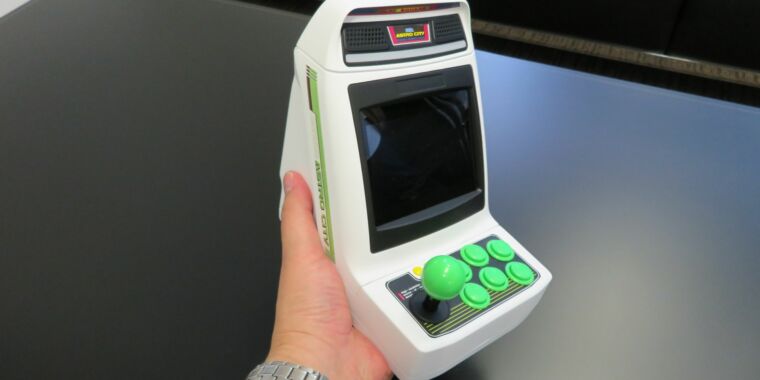
-
Trying to imagine telling my 12-year-old self that this would one day exist.
-
At one-sixth scale, you can hold an Astro City cabinet in one hand.
-
Close up on the controls, which are at one-half scale from a real cabinet.
-
-
A look at the rear shows an HDMI output, two USB inputs, a headphone jack, and a USB power input.
-
This shot really gives you an idea of the extremely tiny scale of this thing.
After the release of the Genesis Mini and the recent announcement of the Game Gear Mini, Sega doesn’t show any signs of slowing down its plans for miniature retro hardware releases. The company’s next entry in the space is the newly announced Astro City Mini, a tiny arcade cabinet set to sport 36 Sega arcade titles.
Japanese site Game Watch was the first to post details about the cabinet overnight, but its story came down quickly (perhaps due to a timing miscommunication with Sega?). That didn’t stop other sites from capturing the relevant details, though.
According to those reports, the Astro City Mini will launch by the end of 2020 in Japan for an asking price of ¥12,800 (about $119). The chassis itself will be at one-sixth scale to an actual Astro City cabinet (5.1×6.7×6.7 inches, or 13×17×17cm), suggesting the original cabinet’s 29-inch screen will be reduced to a roughly 4.8-inch diagonal LCD.
The joystick and six-button control will reportedly be at one-half scale, though, for increased comfort. And that joystick will reportedly sport an eight-way digital switch, which should be a huge improvement over the squishier analog joystick found on 2018’s Neo Geo Mini.
Thus far, Sega has announced 10 of the system’s 36 games, with more announcements planned throughout the summer:
- Alien Storm
- Alien Syndrome
- Altered Beast
- Columns II
- Dark Edge
- Fantasy Zone
- Golden Axe
- Golden Axe: Revenge of Death Adder
- Tant-R
- Virtua Fighter
The unit will take micro-USB power, support HDMI output to a big-screen TV, and support basic emulation functions like save states. Attachable USB control pads (sold separately) will allow up to three people to play on the same mini-cabinet. Any plans for release outside of Japan have yet to be announced.
First released to Japanese arcades in 1993, Sega’s Astro City was a successor to the smaller 1988 Aero City cabinet. The extremely popular universal cabinet design, which works with a wide variety of interchangeable JAMMA arcade boards, can still be found in the “retro” sections of many Japanese arcades to this day, https://arstechnica.com/?p=1689794

